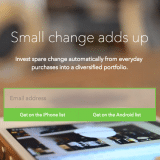Typeform, a platform for ‘conversational’ data collection, raises $35M

Filling out forms online and on mobile can be a tedious and bug-ridden — yet annoyingly necessary — experience. Today, a startup called Typeform has raised a significant round of capital to help fund its mission to change all that, with a platform for third parties to help turn our form frowns upside down.
The startup, based out of Barcelona, is today announced a Series B of $35 million led by General Atlantic as it works on expanding its tools for developers and to drive deeper into international markets. Along with the funding and in keeping with its platform focus, the company today is also announcing a new portal for developers.
“We are proud to be the first company to transform the online data collection space by creating conversational forms. But now we’d like to take things further,” said Robert Muñoz, co-CEO and cofounder of Typeform, in a statement, who believes that Typeform is playing a role in “bridging the gap between data collection and customer interaction.”
This round also included participation from Index Ventures, Point Nine, and Connect Ventures, all previous backers. The valuation is not being disclosed but in its last round of around $15 million two years ago, Typeform was apparently worth around $100 million, according to Funderbeam. (I’m asking around to see if I can get a more current number and will update when and if I learn more.)
Other notable investors in Typeform include Anthony Casalena, CEO of Squarespace; Javier Olivan, VP of growth at Facebook; and Jay Parikh, Facebook’s VP of engineering.
It sometimes happens that the most successful startups are founded in response to an enterpreneur’s frustration with an existing product or service. And so it was the case with Typeform. Co-founder Robert Muñoz and David Okuniev are both designers — specifically with focuses on interaction, UX, and UI — and running their own agencies back in 2011, they found themselves working jointly on a single brief (for a toilet company of all things).
In that work, they found themselves unable to find any templates or platforms to build online forms that could help their client not only get users to fill out their information with reliable regularity (no pun intended to the toilet company) but provide details that could be used for sales in the future.
The two set out to build something themselves, and then used that as the basis of what became Typeform, first launched in 2012, a more dynamic form-creating interface that presented questions one at a time.
Today, creating basic online forms is nearly a commoditised business, with companies like Google offering products like Forms free of charge, and social media platforms like Facebook and Twitter letting people create free polls and other services, and so on.
Unsurprisingly, Typeform has been iterating on its original product over the years, and today concentrates more on APIs and other developer tools, which are offered in a freemium model based on usage and additional features.
At the same time, the startup has very much pushed into making its service something that one can use in any scenario where a user might need to enter data: from basic information entry like job application and contact forms; through to surveys; registration forms; shopping and order forms; online learning and tests; and invitations.
Typeform’s today describes its form-filling platform as “conversational”, but its original concept behind that pre-dates a lot of the talk we hear today about conversational AI, and bots.
On the other hand, Typeform’s ethos is also very contemporary: it focuses on presenting and asking for information using conversational language, and works on the basis of feeding questions one at a time and getting answers in return and tailoring subsequent questions based on those responses.
That focus on creating an interactive platform based around natural language is one reason why investors were interested in helping fund the startup to grow.
“Digital forms are transitioning from a simple data-collection tool into an integral part of the customer engagement journey,” said Chris Caulkin of General Atlantic, in a statement. “With its developer targeted go-to-market strategy and versatile, highly customizable product, we believe there is a significant opportunity for Typeform to continue to grow. We look forward to working with Robert, David, and the entire Typeform team to further expand the company’s global footprint and network.” Caulkin is joining Typeform’s board with this round.
The interactivity and square focus on sales and customer relationships also makes the company a prime target for acquisition, in my opinion, with companies such as Salesforce, Google, Facebook, Microsoft/LinkedIn and many others all looking at better ways to help businesses interface with users, particularly across platforms with more tricky interfaces, like mobile. In the meantime, Typeform is also working on integrating more with other, existing platforms, such as Mail Chimp.
It’s not clear how many users Typeform has today but customers include both small and medium sized businesses as well as Fortune 500 companies in the tech, retail, and hospitality industries.











